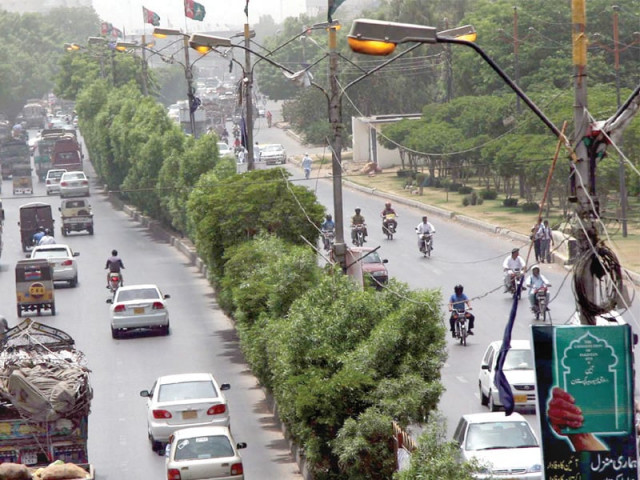Karachi admin owes KESC over Rs3 billion
Towns say they don’t have the revenue to pay

As of September 2012, the outstanding dues of the Karachi Metropolitan Corporation (KMC) and 18 towns for street light connections stands at Rs633 million and Rs2.5 billion, respectively, the Karachi Electric Supply Company (KESC) says.
There is no data available on how many of the 100,000 poles across the city remain switched off for one reason or another but background interviews and resident feedback suggest half of them don’t work.
“We haven’t disconnected any street light because of unpaid bills,” said Aminur Rahman, the KESC spokesman. “And yet this is damaging our reputation. We don’t switch on or off the lights. That’s the job of municipal authorities.”
From University Road to Korangi Road and thousands of streets in places stretching from Malir to Saddar, darkness prevails with sunset. The lights should remain switched on throughout the night but that is hardly the case.
While KMC is responsible for ensuring proper lighting on 28 main roads in the city, responsibility for the management of street lighting lies with towns in their respective jurisdictions.
Officials give multiple reasons for the problem but financial woes of the municipal institutions remains the main reason for the problem.
KMC’s director for technical services, Altaf G Memon, says KESC is not the only organization which faces embarrassment. On a recent tour around the city to inspect projects, the governor noticed unusual darkness and inquired what was happening. There was no easy convincing.
“We are facing this problem at many places like University Road and Ibne Sina Road. Street lights don’t work,” said Memon. “But you can’t blame it on us entirely. Large chunks of cables are missing from across the city. People steel electrical systems, fixtures and even bulbs.”
The theft of wires, cables and anything that can be reached with the help of a ladder along the roads remains in range of thieves, mostly drug users, he said. “It’s a dilemma for us. There is no easy way to stop it. Nevertheless, we have been able to apprehend a few thieves with the help of CCTV footage.”
He said at many places street lights don’t work because of the frequent power breakdowns. “Where do you think the electricity for the poles comes from if not from the same system?”
Memon insisted lights on major roads are in working condition and if they are not working then that is because of KESC. But his reasoning is hard to believe.
A trip to places in Korangi, Clifton, Gulshan and Saddar after sunset showed that there was no power breakdown but the street lights were shut off.
On the other hand, it appears the cash-strapped town administrations have decided to ignore the matter as insignificant at a time when even paying basic salaries of employees remains a constant struggle between local and provincial governments.
“Everything that’s wrong is happening with us,” said the administrator of one of largest towns of the city. “We don’t get the money from the government and political interference doesn’t let us raise local taxes. In the end there is no money to pay the bills.”
Earning income from a renewal of trade licences of tens of thousands of shops, penalties for using footpaths and roadsides, taxes on wedding halls and functions should be enough to pay all the bills, said the administrator. “But we collect peanuts.”
Notwithstanding these reasons, the job of KESC’s spokesman Aminur Rahman is getting tougher as every few days he responds to letters written by residents who complain of street lights being switched on even during the day.
“On one hand, they have switched off the lights and on the other they forget to turn them off during the daytime. It gets really frustrating for us to tell everyone that we have nothing to do with it. KESC is not even getting paid and yet the blame is on us.”
Saddar Town Administrator Asim Ali says the KESC figure is exaggerated. “They get the payments from the provincial government, which in turn deducts it from our share of the divisible revenues.” He said KESC is charging the towns a commercial tariff for power, which is used to run the street lights. “Street lights are for public service. We can’t be made to pay so much.”
Published in The Express Tribune, November 5th, 2012.






1724319076-0/Untitled-design-(5)1724319076-0-208x130.webp)












COMMENTS
Comments are moderated and generally will be posted if they are on-topic and not abusive.
For more information, please see our Comments FAQ